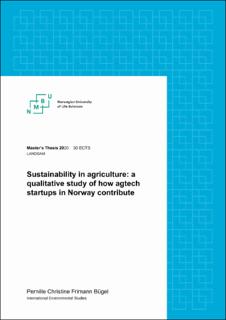| dc.contributor.advisor | Westengen, Ola | |
| dc.contributor.author | Bügel, Pernille Christine Frimann | |
| dc.coverage.spatial | Norway | en_US |
| dc.date.accessioned | 2020-10-16T13:51:19Z | |
| dc.date.available | 2020-10-16T13:51:19Z | |
| dc.date.issued | 2020 | |
| dc.identifier.uri | https://hdl.handle.net/11250/2683423 | |
| dc.description.abstract | The purpose of this study is to analyse the contributions to sustainable agriculture from the agtech companies on the rise in Norway. Agtech is a growing sector in agriculture focusing on innovative technology to improve agricultural efficiency and applicability. Agriculture is still one of the sectors worldwide that has not implemented newly developed technology to a large extent. Thus, this study aims to shed light on the huge potential in this industry that can mitigate the challenges of climate change, and meeting criteria for food security globally. The goal of this study is to look more closely at sustainability contributions by Norwegian agtech companies and products, through the lens of degrowth and ecomodernist theory in a sustainability perspective. Interviews with agtech companies were undertaken to assess their sustainability impact. Sustainability can be difficult to define, as was made clear during research, however the data collected demonstrated a willingness to be sustainable throughout their business strategies. I discovered a trend that the products they develop are part of improved efficiency in agriculture, which in turn may lead to sustainability on multiple levels. This entails using advanced technology that can be implemented to ensure less environmental degradation as well as tools to change the farming system as we know it. Collected data indicate the need for more support surrounding agtech companies in Norway, for them to be successful in adding value in the green shift and towards sustainable agriculture.
Agtech seeks to improve agriculture in all dimensions of sustainability, with rising growth and support. Better choices in farming can become available using new technology, which can withstand any changes agriculture encounters. The future is digital, however, whether it be large-scale conventional farming or smaller farming methods remains to be seen. Ultimately, I have no doubt that the future of farming is digital, and agtech has the potential to contribute towards sustainable agriculture. | en_US |
| dc.language.iso | eng | en_US |
| dc.publisher | Norwegian University of Life Sciences, Ås | en_US |
| dc.rights | Attribution-NonCommercial-NoDerivatives 4.0 Internasjonal | * |
| dc.rights.uri | http://creativecommons.org/licenses/by-nc-nd/4.0/deed.no | * |
| dc.subject | Sustainability | en_US |
| dc.subject | Agtech | en_US |
| dc.subject | Agriculture | en_US |
| dc.title | Sustainability in agriculture : a qualitative study of how agtech startups in Norway contribute | en_US |
| dc.type | Master thesis | en_US |
| dc.subject.nsi | VDP::Landbruks- og Fiskerifag: 900::Landbruksfag: 910 | en_US |
| dc.source.pagenumber | 64 | en_US |
| dc.description.localcode | M-IES | en_US |

